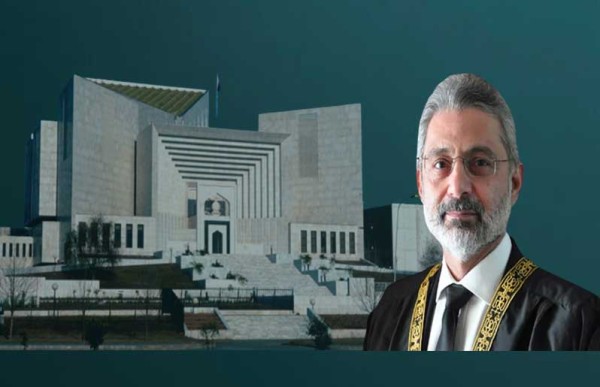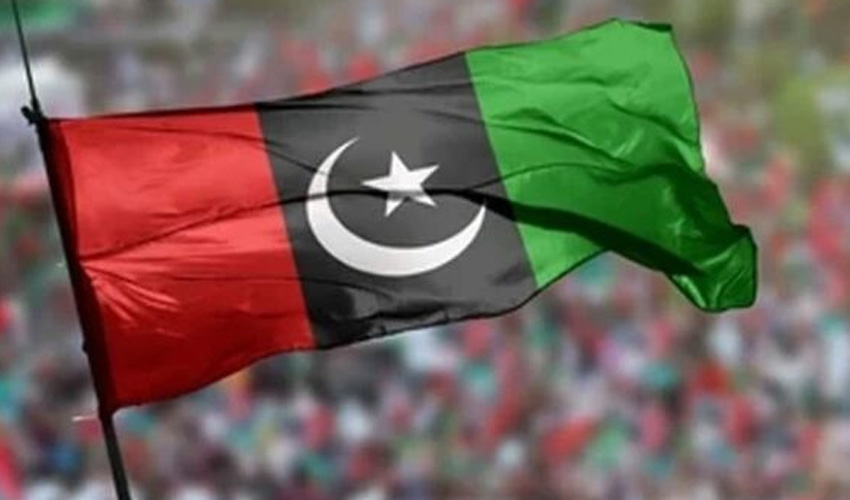A senior Supreme Court judge has remarked that if the Pakistan Tehreek-e-Insaf (PTI) wanted a level playing field, it should offer it within the party as well, adding that if it had conducted its intra-party election according to its constitution, the poll would have been the most transparent in Pakistan.
These remarks were expressed by Justice Muhammad Ali Mazhar, as the Supreme Court has resumed hearing the election commission's appeal against the Peshawar High Court's decision to allow the Pakistan Tehreek-e-Insaf (PTI) to use the 'bat' symbol.
A three-member bench, led by Chief Justice of Pakistan Qazi Faez Isa, heard the case.
The Supreme Court had on Friday postponed the hearing on the 'bat' symbol case of the PTI till Saturday. CJP Isa had emphasised that the election commission is a constitutional institution, and no entity should interfere in its functions.
At the outset of the hearing, PTI lawyer Barrister Ali Zafar told the court that Saturday was the last day to submit party tickets to the returning officer concerned. He further said that neither the Constitution nor the Elections Act 2017 authorized the scrutiny of intra-party elections or allowed any party to lose its electoral symbol.
The ECP could not withdraw the election symbol on the allegation of irregularities, Ali Zafar maintained, adding that every political party has the right to contest elections on a single symbol. He further said that depriving a party of an election symbol is a denial of fundamental rights.
The counsel stated that the election commission was not a court of law, adding that if a wrong decision has been given, it can be judicially reviewed. He further accused the election commission of discrimination.
“The Election Commission of Pakistan hold a fair trial nor did it take place. No PTI member challenged the intra-party election,” Ali Zafar added.
The PTI is a private association of citizens, the lawyer remarked, adding that the ECP did not have the auo motu authority to decide on its own and hear appeals also.
He stressed that the intra-party elections were conducted as per the constitution of the party, adding that 14 petitions were filed against the election with the election commission. However, the party’s stance was that the petitioner was not a party member.
He claimed that the ECP order withdrawing the party symbol admitted that intra-party elections were held, but did not mention any irregularity in its decision.
The CJP questioned whether there was democracy within the party or not. Election transparency is rarely recognized in Pakistan, he added.
Justice Mazhar remarked that the Election Commission of Pakistan did not take suo motu, but 15 complaints were filed with it. “If you talk about level playing field, then it should be practised in your party also,” he added.
He also said that the PTI had made its constitution so strict that questions were being raised over it. “If you had conducted the election according to your constitution, it would have been the most transparent election of Pakistan,” Justice Mazhar remarked.
Previously, the PPP was deprived of its election symbol of the sword after which the PPP Parliamentarians was formed, said Ali Zafar.
CJP Isa remarked that the PML-N had also seen a similar time, but it was to be seen who was in the government at that time. “The PTI’s opponents are not in government today,” he said, adding the word ‘establishment’ was used, while the real name was the army.
“We know from history how political parties have been affected,” the CJP stated, and asked the counsel to show at least something that proves the intra-party poll was held.
CJP Isa said the PTI founder was currently in jail, adding that in such a situation, the importance of party elections increased.
“If, when he’s released, he says he doesn’t know who these people are,” the top judge said.
Justice Mazhar said the main point was the authority of the election commission, adding that if that was not there then the rest will cease to exist itself.
Friday's proceedings
At the start of the hearing, the Chief Justice asked if the detailed verdict from the Peshawar High Court had been released, to which PTI's lawyer Hamid Khan responded that it had not.
The lawyer for the ECP, Makhdoom Ali Khan, presented and explained the Peshawar High Court's decision to return the bat symbol to the Supreme Court.
Hamid Khan requested time until Monday to prepare, but the Chief Justice suggested working through the weekend to avoid further delays. Justice Qazi Faez Isa expressed the urgency of holding elections on time and in accordance with the law.
The Chief Justice admitted to not having read the case file and asked Hamid Khan about his readiness for the case. Makhdoom Ali Khan highlighted that electoral symbols needed to be allotted to candidates the next day, while Hamid Khan requested time until the following day to prepare. He also questioned the Election Commission's right to file an appeal, stating that it is a partial judicial forum without the authority to sue.
Justice Qazi Faez Isa pointed out that the ECP is a constitutional institution, and if objections are raised on its appeal's admissibility, similar questions may arise regarding PTI's approach to the Peshawar High Court.
The lawyer of the ECP clarified that PTI's failure to hold party elections as per its constitution led to the issuance of a notice by the Election Commission, emphasising the need for adherence to the party constitution.



























